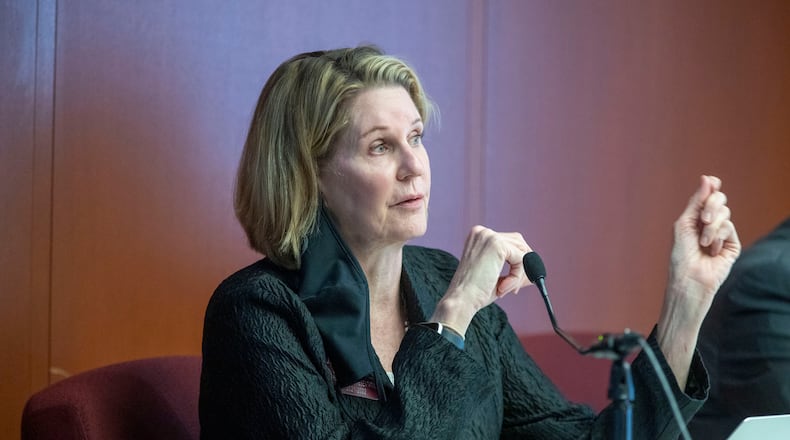When the second-ranking Republican in the Georgia House saw a proposal to ban “obscene” books from libraries, she dialed up state education officials to raise her objections. Two years later, Jan Jones is pledging to make a similar idea a top priority in an election-year legislative session.
Jones, the chamber’s speaker pro tem, sparked backlash recently when she announced plans to back anti-obscenity legislation. She said the effort, also endorsed by State School Superintendent Richard Woods, is aimed at bringing uniformity to the way public school districts block student access to online sources.
It’s a revamped version of the legislation she once opposed. That bill was sponsored by several House Republicans in 2020 and would have enhanced penalties against any “person affiliated” with a school, including a guest speaker, who knowingly shared obscene materials with minors.
Back then, she called Garry McGiboney, who was then a deputy state school superintendent, to discuss the proposal. He relayed to fellow education officials in a January 2020 email that Jones is “concerned that this may get some momentum and she wants to head it off by taking a position with the Caucus about the bill.”
Asked about the email this week, Jones said she didn’t recall encouraging state education officials to help her “head off” such legislation. But she said she raised concerns about penalizing educators who might have inadvertently or unintentionally exposed students to “age-inappropriate material.”
“Generally, school systems make decisions about internet filters for school-issued devices and school-related search engines,” she said. “Some systems select filters that are strong. Others do not. I do not support penalizing educators for activities over which they do not possess authority.”
(State education officials downplayed McGiboney’s email, saying it was written by an employee who has since left the agency and wasn’t involved in policy or legislative affairs. Spokeswoman Meghan Frick said the agency gave Jones “basic information” about existing law in response to her 2020 request.)
Jones said her proposal, which is still being drafted, will try to create a “fair and consequential process” to address educators who use poor judgment or intentionally expose students to inappropriate materials. It might also borrow from a Senate proposal that created a “complaint resolution process” for parents, she added, but it won’t include additional criminal penalties.
“There will be multiple ways to skin this cat,” Jones said, “and I intend to see it through.”
The fast-shifting dynamics of the debate over obscenity legislation in Georgia, where the idea was once opposed by key state leaders who now embrace it, underscores the draw of base-pleasing proposals in an election year.
If Georgia lawmakers take up this proposal, they would follow the lead of a growing number of state and local governments that are contemplating banning certain books dealing with topics of race and gender.
Among the targets: Nobel Prize winner Toni Morrison’s “Beloved,” a novel about the horrors of slavery that includes graphic descriptions of sex, and Maia Kobabe’s “Gender Queer,” a memoir and graphic novel that contains explicit illustrations of sexual acts.
Those titles sparked backlash from governors in South Carolina and Texas, and they fed a recurring theme in the race for Virginia’s top job. They’ve also triggered outrage from First Amendment advocates and others who fear a government-backed attempt at censorship in school libraries.
The Georgia Library Media Association was among the loudest critics of Jones’ proposal, saying that the state shouldn’t join the ranks of others “to promote mass book banning that will deprive students of their freedom to read.”
“School districts already have policies and procedures in place for parents to ask for any library materials to be reviewed by a committee made up members of the school community,” said Amanda Lee, the group’s president-elect.
“There is no need for new state laws as parents and guardians have the ultimate authority of what their child reads,” she said.
Jones, for her part, said the legislation isn’t aimed at stoking a brand-new culture war. Instead, she said, she wants it to be a needed remedy for a growing technological challenge.
“This problem has gone on for too long,” she said, “and has been exacerbated by increased online learning from kindergarten to graduation as a result of the pandemic.”
Staff writer Ty Tagami contributed to this article.
About the Author
The Latest
Featured



